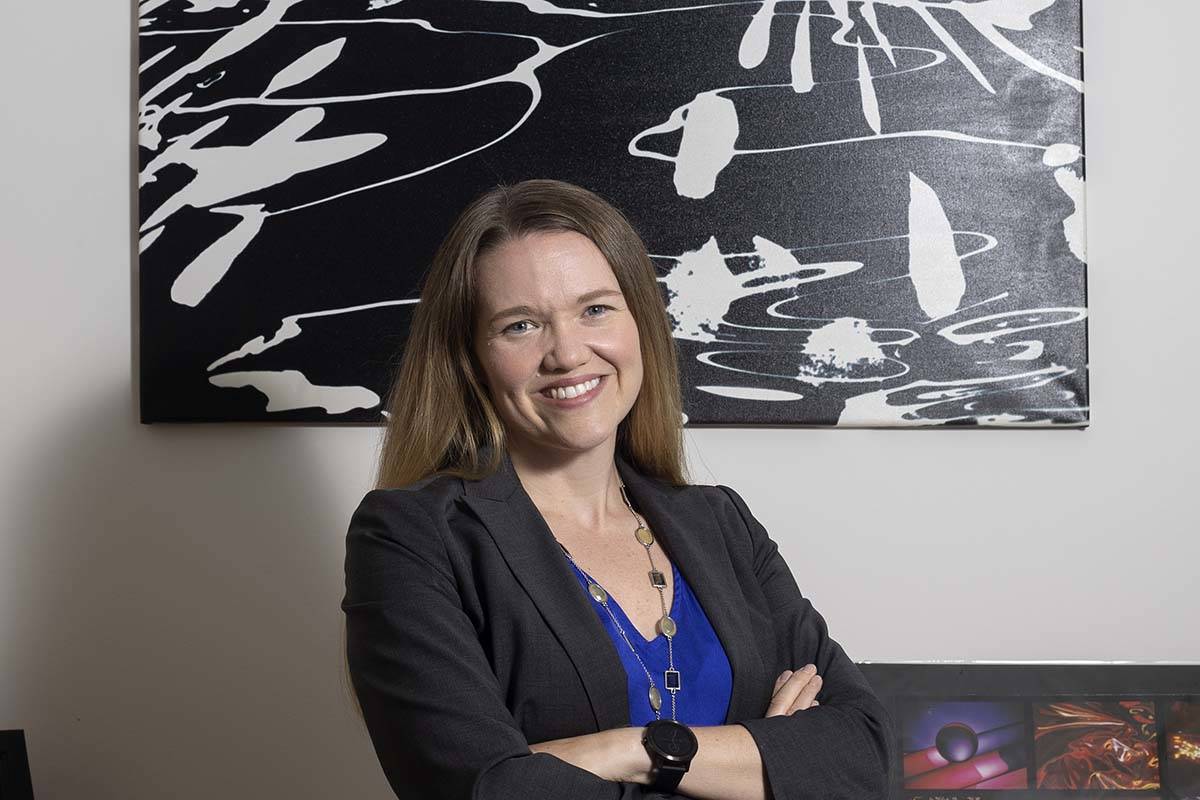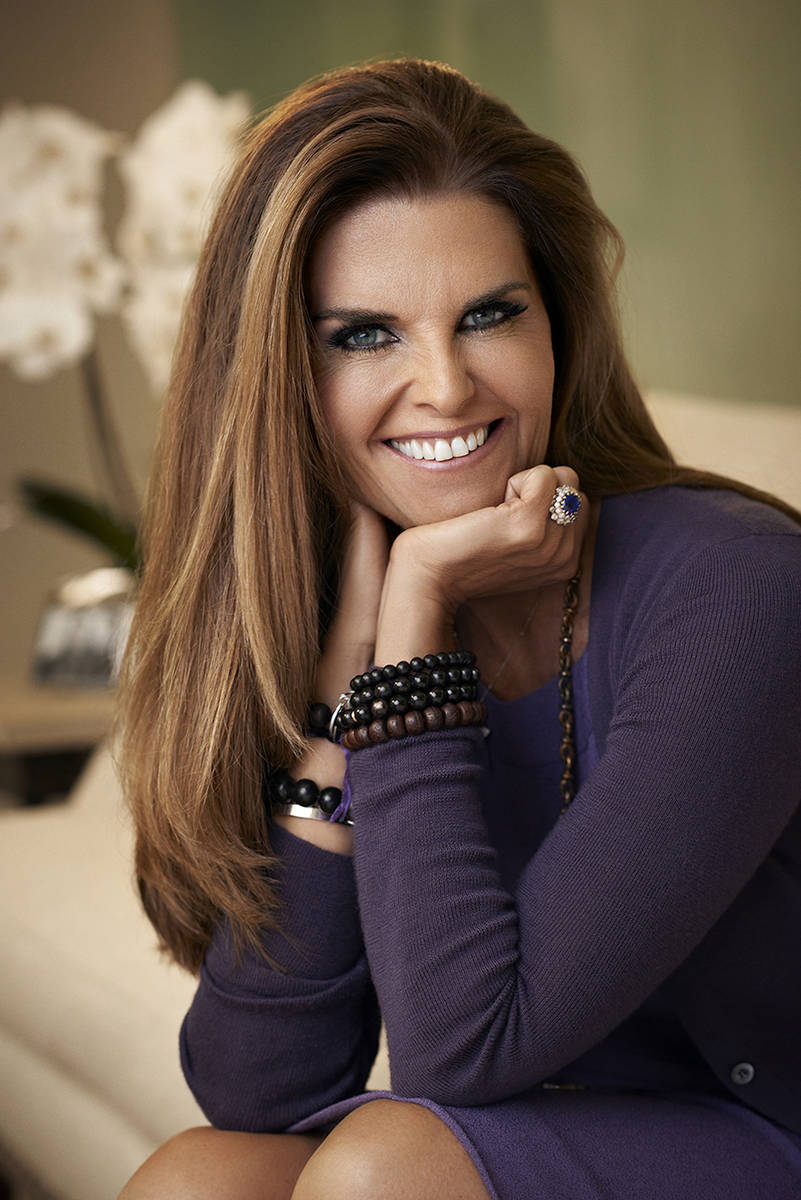Dream of Alzheimer’s center for women comes true in Las Vegas
Early this week, Maria Shriver was having what she would later describe as “a moment.”
When her younger son, 22-year-old Christopher Schwarzenegger, walked into her Brentwood, California, home office and saw her eyes brimming with tears, he asked, “What’s wrong, momma?”
Nothing was wrong, she told him. The tears were ones of happiness and relief.
Shriver was reading a draft of a news release announcing the launch Thursday in Las Vegas of her brainchild: the first women-specific center in the country offering Alzheimer’s disease prevention, research and caregiving support.
“I’m rarely proud of myself, but I’m proud of myself here,” Shriver, a journalist, author and former first lady of California, told the Review-Journal on Tuesday. “And I’m proud that it’s gonna help people. I’m just really happy it’s gonna help someone.”
The Women’s Alzheimer’s Movement Prevention Center at Cleveland Clinic is in the Cleveland Clinic Lou Ruvo Center for Brain Health in downtown Las Vegas. The concept behind the new center is based on research indicating that up to one-third of all Alzheimer’s cases might be prevented through risk-reduction strategies.
Three years in the making, it is the fruit of a longstanding partnership between Shriver’s nonprofit, The Women’s Alzheimer’s Movement, and the Ruvo Center. It is also testament to the friendship between Shriver and Las Vegan Larry Ruvo, founder of the Ruvo Center.
Shriver’s Alzheimer’s advocacy dates back longer, to when her late father, Sargent Shriver, was diagnosed in 2003 with the devastating brain disease.
“Women and Alzheimer’s has been my jam, my passion, my mission, my Achilles’ heel,” she said in an exclusive interview. “It’s what gets me up. It’s what drives me.
“So to be able to have a clinic on the ground that I could send people to who are interested in prevention, that I can send people to that want to take care of their brains, is a dream come true.”
Just for women
Shriver became focused on Alzheimer’s disease in women when she learned that women account for two-thirds of the cases, a statistic that often had been dismissed as simply the result of women living longer.
She made it her mission to learn more. “When I reported it to the community, and to the nation at large, that this was disproportionately a woman’s disease, that it disproportionately impacted women and women of color, I got a lot of pushback on that,” said Shriver, who has written books and produced an Emmy-winning documentary about the disease.
“And so I have been funding researchers who believe what I believe, who want to close the gap on what we know about women and how they age,” she said.
Jessica Caldwell, the women’s center’s director, said, “Women’s brains are different from men’s, and it’s still something we’re learning about.”
One difference is the role played by estrogen, which is “important not just for reproduction, but for brain health and brain function,” said Caldwell, a neuropsychologist with expertise in brain health, memory, aging and women’s risks for Alzheimer’s disease.
A woman’s brain responds differently when she needs to remember something, Caldwell said, and it ages differently. Despite differences between the genders, most research has focused on men, something that the center aims to change.
“This is not sexist. It is just smart,” Shriver said.
Focus on prevention
The center is designed for middle-aged women who do not have symptoms of Alzheimer’s but who are concerned about their risk for the disease and are willing to change their behavior.
Changes in the brain begin two decades before a person develops symptoms of Alzheimer’s, which is why the center targets women as young as 30 up to those in their 60s.
“We need to intervene earlier than we ever have in the past,” said Caldwell, noting that the onset of symptoms often occurs in one’s mid-70s.
The women’s center will assess a patient’s individual risk factors for Alzheimer’s, evaluating her diet, exercise, stress levels, sleep, mood and general health.
A patient will be asked to fill out an initial online assessment, and then meet with Caldwell and separately with a family physician. Blood work and other lab work are ordered.
Using all this information, the center then will create a customized plan to mitigate the woman’s risks.
The center will follow up quarterly with the patient, who will return to the clinic a year later to repeat the process.
“It isn’t a magical solution. We’re offering a very specific plan for women to change their lives,” Caldwell said. “What we’re asking women to do isn’t easy. But we think it’s worth it, and they’ll benefit.”
“I wish this had been available to me when I was in my 40s,” said 64-year-old Shriver, who has overhauled her own lifestyle, including keeping to a diet rich in fish and vegetables. “I wish people were talking to me about this when I was 50.”
The women’s center is a three-year pilot project, with most of its services funded by philanthropy. The initial scope of the center is to assist 380 women over the next three years. “Additional funds are needed to expand the program, notably its research component,” according to the news release announcing the opening of the center.
“I think what this clinic will do will allow women who are at risk for whatever reason to have some knowledge and tools decades before they have any symptoms,” Caldwell said. “Maybe they are in that lucky one-third of patients who may be able to reduce their risk for Alzheimer’s disease, delay the disease onset or even prevent the disease from occurring in their lifetime.”
Shriver said that everyone she knows who are 50 or older are concerned about Alzheimer’s disease. “And there are people in their 30s and 40s who are like, ‘I don’t want that. And so what do I need to do now?’”
Fear of the disease “can be paralyzing or motivating,” Shriver said. “It’s up to you.”
Contact Mary Hynes at mhynes@reviewjournal.com or 702-383-0336. Follow @MaryHynes1 on Twitter.
For more information about The Women's Alzheimer's Movement Prevention Center at Cleveland Clinic and to make an appointment, visit WomenPreventAlz.org or call 833.WOMEN.AD (833.966.3623).



















